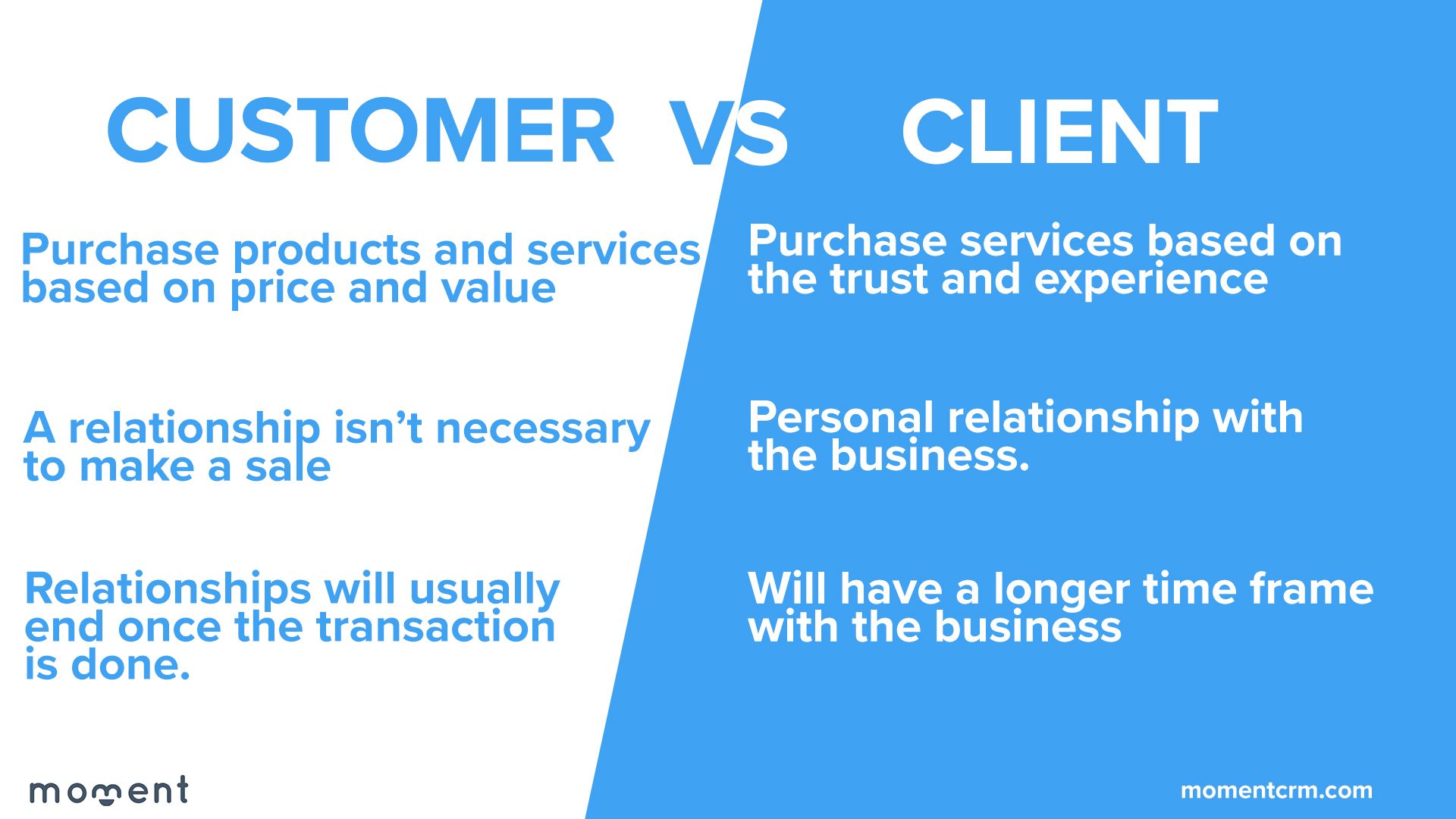Customer vs Client. What’s the difference?

Do you have customers or do you have clients? As both help your business grow, what are the differences between the two? Many business owners will sometimes struggle to define their target market and understanding if they have clients or customers.
Are your customers your clients or are your clients your customers? While both definitions are similar as they provide money for an exchange of products or services. Customers and clients have different buying behaviour, business relationships and customer lifecycle.
We’ll go over the definition of each and the difference between customer vs client.
Definition of a customer
A customer is an individual or group that buys another company’s product or services. The number of customers a business has can be an indicator of how well a business is performing. So when someone buys one of your products, they officially become a customer. However, customers can be a one-time occurrence or come back multiple times.
It’s safe to say that customers have more casual or impulsive purchase behaviour. Customers base their purchase decisions on value and price.
While customer loyalty and customer retention help grow your business, they can switch to competitors without any barriers or obligations. Many competitors will have the same competitors as they can choose between them of who to buy products from.
The types of business that tend to have customers are:
- Retails stores
- Restaurants
- Grocery stores
- SaaS Companies
Now’s let’s define what a client is
Definition of a client
The formal definition of a client is a person who engages the professional advice or services of another.
Clients are pretty much recurring customers who will only go to a single business for services. There is more of a personal relationship between the business and client and are looking for long-term purchases.
Clients will base their purchasing decision on the experience and trust of the business. Competitors will not have the same clients as clients are looking for only one service provider. For example, a business won’t have multiple marketing agencies, or a lawyer won’t represent both the defendant and accuser.
The type of businesses that have clients are:
- Financial advisors
- Lawyers
- Marketing agencies
- Insurance agency
- Real estate agency
- Consultants
Now that we understand the definitions, let’s discuss the difference between customers and clients.
What’s the difference between a customer and a client
Now that we defined what both customers and clients are, let’s discuss the main differences between the two.

Definitions
Customers purchase products and services based on price and value. Their buying decisions are more impulsive. Clients will purchase services based on the trust and experience of the business. Clients look for long term decision and the services that are looking for. Clients will
Business relationship
Clients and customers will have different business relationships. Clients will have more of a personal relationship with the business. Since the clients are looking for more of a long-term purchase than a customer.
It is possible to create customer relationships to help build customer trust and loyalty but isn’t necessary to gain a sale.
To get more clients, it’s essential to build that trust and transparency since they’re making a purchase/ investment based on experience and trust. Customers will have no problem buying from a new store, but clients will be more hesitant to purchase from a new business.
Different customer life cycles
Customers and clients will have different life cycles and duration of interacting with the business. Clients will have a longer time frame as the services that are provided tend to be for bigger and longer decisions. Customer relationships will usually end once the transaction is done.
Similarities of a customer and client
Now you understand the difference between a client and a customer. However, both have similarities that will affect a business.
Transaction
As mentioned above, both clients exchange money for some sort of product or service. While both will have different purchasing behaviour, both are still looking for products and services that help fulfill their wants and needs.
Experience
Both customers and clients can have a positive or negative experience with a company. Both experiences will have an impact on a business. A negative experience will usually have the same results for both customer and client-based companies and can result in their customer and clients leaving for a competitor. That’s why it’s important to do everything you can control to help prevent customer churn.
Closing Thoughts
Customers and clients are different in terms of the relationship they have with the business, the type of product or service they’re looking for, and the duration of the interaction. However, clients and customers are similar as they can help a business grow!
Both exchange money for either a product or service that helps them fulfill their needs and wants. Both customers and clients are looking for the best products and services that provide them with the best value for their money. They also have both positive and negative experiences that can affect a brand reputation, customer reviews and revenue.
Whether you have clients or customers, it’s important that your business values them, provides great customer service and keeps them happy. Be sure to take the time to understand what you have so you can create a business and marketing plan that will attract your target market.
Do you prefer the terms clients or customers?
